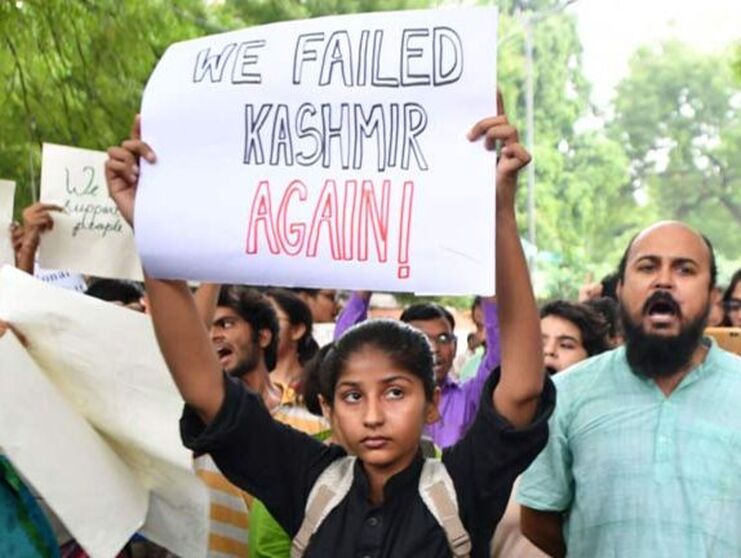|
|
|
'Free Kashmir', reads the placard held by a young Indian woman during an anti-Citizenship Amendment Act agitation at the Gateway of India, Mumbai, on 6 January 2020. That India cannot tolerate such 'separtist sentiments' is central to the outrage over the placard. People in her supporting circle defend it on the grounds that it meant freedom from Internet lockdown imposed since 5 August 2019 across Kashmir. The woman comes out with a statement: 'I was voicing my solidarity for the basic constitutional right'.
As Kashmiris, what does it mean to be shown solidarity with terms and conditions, one that disallows a Kashmiri from envisioning their freedom but dictates its meanings and interpretations for them? In our Identities article, 'On Solidarity: Reading Love, Loss, and Longing in Kashmir', we engage with the question of solidarity through a critical reading of Sahba Husain’s book Love, Loss, and Longing in Kashmir. The multiple ways in which claims of solidarity are articulated by Indian ‘progressives’ often result in reflecting dominant narratives that obfuscate the lived realities of the occupied Kashmiri people. This is brought forth in the piece through an analysis of how the concepts of disillusionment, alienation, resilience find expression in these works.
Kashmiris have, over the decades, not only witnessed Indian State's war to suppress their aspirations of freedom, but also sugar-coated obfuscation by Indian academia and left-liberal activists of the popular struggle for Right to Self Determination. Quite rarely have Kashmiri voices for azadi been amplified the way Kashmiris articulate it. Most of the reports and works by Indians on Kashmir have otherwise been what Parrey (2019) refers to as ‘fact finding tourism’ – inaccurate and problematic.
A significant feature of such liberal, progressive works on Kashmir has also been to either present Kashmiri women as hapless victims, or needing to be saved from societal Islamic patriarchy. Their resistance and resilience is written as a spectacle, as if they have a choice in the matter when their homes and bodies are turned into battlegrounds. However, as Kashmiri women have shown over the years, they are not a spectacle when they are out on streets; they have been a significant presence alongside Kashmiri men demanding azadi. As they found their homes converted into battlefields, the women decided the terms of their participation in challenging the might of the Indian State. From the everyday acts of walking across militarised streets where they are subjected to the masculinist gaze of gun-wielding soldiers, to the institutionalised form of resistance through the Association of Parents of Disappeared Persons (APDP), for example, where personal loss finds expression in regular protests in the public sphere, women have refused to let a militaristic structure determine the form and structure of their resistance. Despite widespread violence that has resulted in killings, enforced disappearances, sexual violence, torture, mass blinding, unmarked and mass graves, people have found ways to resist, to commit things to memory – every slogan on the street, every date that marks a massacre, form a part of the collective memory. But the State understands this memorialisation as threatening its very existence in Kashmir. In fact, APDP has been prohibited from even constructing a memorial in the memory of the disappeared. A marble plaque they tried to construct in Srinagar in 2002 was destroyed by the police within hours and two of its members were charged with trespassing. In the years since militarisation of Kashmir, not only have acts of violence by Indian soldiers been perpetrated in the various physical structures of the State machinery including torture centres, camps, police stations, the streets, and even within the apparently safe spaces of homes, but entire neighbourhoods have been destroyed right from the initial days of counter-insurgency to break the will of the people. A news report quoted a retired lieutenant general of the Indian Army as saying that destroying houses has been a part of counter-insurgency, and there is no question of outrage, for ‘you are complicit’. Yet, conditional solidarities are extended to the ‘innocent Kashmiri civilian’ pitched in a binary against the violent Kashmiri other seeking freedom from India. The multi-layered military structure and its violent control necessitating multiple frontiers of resistance is either left out of due engagement or blamed on Kashmiris having been manipulated to commit violence. When there are claims about solidarity with Kashmiris, it cannot be restricted to the Internet alone. Any genuine attempts at solidarity must understand and acknowledge these multiple layers in which the military occupation works: its physical, psychological, sexual manifestations in the everyday. The violations are a response to the Kashmiris’ demand for freedom from the Indian State, not within its constitutional framework. Therefore, we have argued that for Indians to ally with Kashmir, it is important to persistently re-centre Kashmiris’ articulations of a political imaginary that ensures freedom and a dignified life. Reference: Parrey, A. A. 2019. Fact Finding Tourism. RAIOT, September 20.
Blog post by Mudasir Amin, Jamia Millia Islamia, India and Samreen Mushtaq, Ashoka University, India
Read the full article: Amin, Mudasir & Mushtaq, Samreen. On Solidarity: Reading Love, Loss, and Longing in Kashmir. Identities: Global Studies in Culture and Power. DOI: 10.1080/1070289X.2020.1737405
0 Comments
Your comment will be posted after it is approved.
Leave a Reply. |
|
Explore Identities at tandfonline.com/GIDE |
|
The views and opinions expressed on The Identities Blog are solely those of the original blog post authors, and not of the journal, Taylor & Francis Group or the University of Glasgow.

